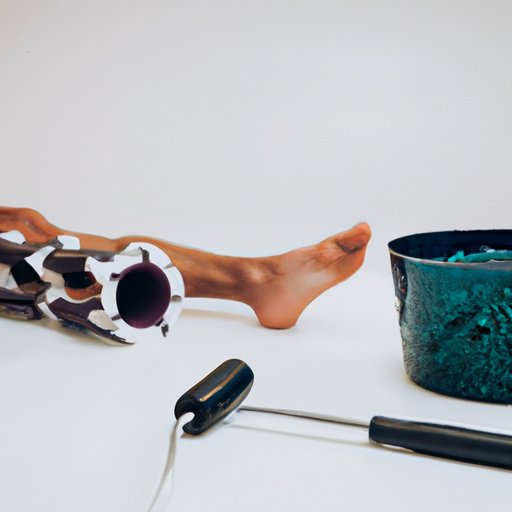
I. Introduction
Most people have experienced sore muscles at some point in their lives. Soreness can be uncomfortable and make it difficult to perform daily activities. It can range from being a minor inconvenience to a severe issue that requires medical attention. In this article, we will explore several ways to get rid of sore muscles, both naturally and with professional help.
II. Importance of Rest and Recovery
One of the most important things to remember when dealing with sore muscles is that the body needs time to recover. Rest is an essential component of recovery, allowing the muscles to repair themselves. Additionally, sleep is crucial, as the body uses this time to regenerate and heal. Taking breaks throughout the day and making sure to give yourself rest days when exercising can also help reduce the risk of developing sore muscles.
Active recovery is another important aspect of rest and recovery. This involves engaging in low-impact activities that can help promote healing and reduce soreness. Some good examples of active recovery include walking, cycling, swimming, and yoga.
III. Stretching and Foam Rolling
Stretching and foam rolling are two practices that can help reduce soreness and improve flexibility. Stretching, in general, has numerous benefits, including increased mobility, flexibility, and circulation. Foam rolling, on the other hand, uses a cylindrical tool to massage sore muscles, helping to release tension and alleviate stiffness. Regularly incorporating stretches and foam rolling into a workout routine can help prevent sore muscles from occurring in the first place.
IV. Proper Hydration
Staying hydrated is essential for overall health, but it’s also crucial when it comes to reducing sore muscles. Dehydration can exacerbate soreness, as the body needs adequate water to lubricate joints and transport nutrients throughout the body. A good rule of thumb is to drink at least eight 8-ounce glasses of water a day, and more if you are exercising or sweating. Drinking water before, during, and after exercising can help keep you hydrated and prevent sore muscles from occurring.
V. Epsom Salt Baths
Epsom salt is a popular home remedy for sore muscles. It is made up of magnesium sulfate, which has been shown to help reduce inflammation and relax muscles. Epsom salt baths are a great way to ease soreness, as the warm water and magnesium can help improve circulation and promote healing. To take an Epsom salt bath, simply add two cups of Epsom salt to a warm bath and soak for 20-30 minutes.
VI. Active Recovery
As mentioned earlier, active recovery can be an effective way to reduce soreness. Engaging in low-impact activities, like walking or swimming, can help increase blood flow to the muscles, promoting faster healing. Additionally, active recovery can help prevent sore muscles from occurring in the future, as it strengthens the muscles and improves overall mobility.
While engaging in active recovery, it’s important to listen to your body and avoid over-exerting yourself. Slow and steady wins the race, and a gentle approach is key to promoting muscle recovery.
VII. Professional Help
Sometimes, soreness can be a sign of a more serious condition. If you are experiencing severe or persistent muscle pain, it’s important to seek out professional help. Some professionals who can help with sore muscles include chiropractors, physical therapists, and sports medicine doctors. These individuals can help identify the root cause of your pain and provide treatment options to help alleviate your symptoms.
VIII. Conclusion
Sore muscles are a common occurrence, but they don’t have to be a constant annoyance. By incorporating rest and recovery, stretching and foam rolling, proper hydration, Epsom salt baths, active recovery, and professional help when necessary, you can reduce your risk of developing sore muscles and help ease any discomfort you may be experiencing. Remember to listen to your body, take it slow, and prioritize self-care for your overall muscular health.




